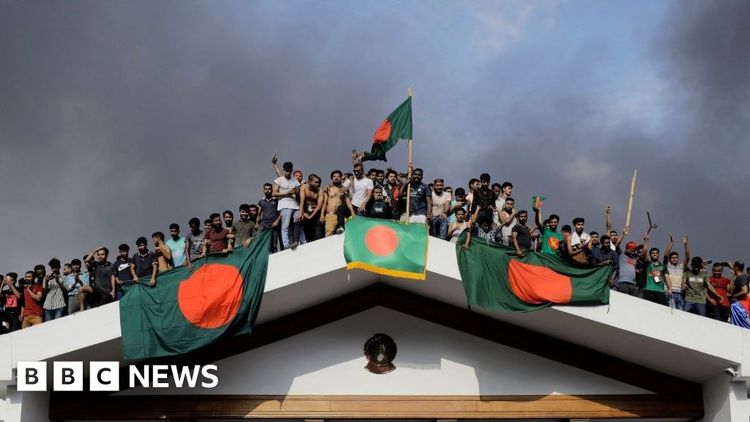Sheikh Hasina: Euphoria in Bangladesh after PM flees country

Bangladeshi leader Sheikh Hasina has stepped down following a series of violent demonstrations against her government, marking the conclusion of her long-standing influence over the nation's political landscape.
Ms. Hasina, who is 76 years old, escaped from the country and apparently arrived in India on Monday.
Excited groups of people flooded the streets to rejoice over the announcement, with some breaking into the prime minister's palace, allegedly stealing and damaging parts of her old home.
A few hours after Ms. Hasina stepped down from her position, President Mohammed Shahabuddin made the decision to set free former prime minister Khaleda Zia, who was in jail, as well as all the students who were arrested during the recent demonstrations against the quota system for government jobs.
President Shahabuddin announced that he had led a discussion with military leaders and political delegates.
He stated that a temporary government would be established, fresh elections scheduled, and a nationwide curfew lifted.
In Dhaka on Monday, demonstrators vandalized and set fire to police and other government buildings. They also tried to dismantle a statue of independence hero Sheikh Mujibur Rahman, who is the father of Prime Minister Hasina.
Military and law enforcement teams were sent all over the city. It was said that mobile phone service was turned off for a few hours and then turned back on.
The protesters were spotted taking furniture from the prime minister's house on Monday.
Many people were reported to have died on Monday, but the exact number of casualties was not known. The AFP news agency stated that 66 people had died, while the Dhaka Tribune suggested that the death toll could be even higher at 135.
Ms Hasina's exit creates a gap in Bangladeshi politics, which has always been defined by the competition between her Awami League and the Bangladesh Nationalist Party.
The nation has gone through multiple instances of military takeovers, with the most recent one occurring in 2007.
The United States praised the military for showing "restraint" and suggested the establishment of a temporary government. The European Union called for a smooth and peaceful shift towards a government elected by the people.
India, the neighboring country and regional powerhouse, did not provide any official response.
Debapriya Bhattacharya, an experienced economist at the Centre for Policy Dialogue in Dhaka, stated to the BBC that although many people in the streets were very happy about the resignation, violence against the Hindu minority has increased. This is a major problem that the new government must address right away.
Many believe that India fully supports Sheikh Hasina's government. Demonstrators are not differentiating between India and Hindu residents of Bangladesh, resulting in violence and vandalism against temples and individuals.
With no one in charge, there is a gap in power and no one is ensuring that laws are followed. It will be the responsibility of the incoming government to ensure the safety and protection of religious minority groups.
Ms Hasina's supporters stated that she had no intention of re-entering the political arena in the country. The ex-prime minister has served a combined 20 years in leadership, initially assuming office in 1996.
Sajeeb Wazed Joy, the son of the woman in her late 70s, expressed to the Newshour show on BBC that his mother is feeling very let down. Despite all the effort she has put in, she is disheartened by the minority who have turned against her. Joy believes that she may have reached her limit.
My family and I have reached our limits.
Critics argue that during Ms. Hasina's leadership, there were allegations of enforced disappearances, extrajudicial killings, and suppression of opposition members and critics of the government.
However, Mr. Wazed, who also acted as an advisor to the prime minister regarding technology, supported his mother's accomplishments.
In the past 15 years, she has completely transformed Bangladesh.
When she assumed control, the country was seen as a struggling nation. It was a low-income country.
Until now, it was seen as a potential leader in Asia.
Approximately 300 individuals have lost their lives in the last month as protests erupted regarding a quota system for government employment. The protests, which were met with severe crackdowns by governmental authorities, escalated into a wider movement against the government.
According to Dr. Chietigj Bajpaee, a researcher at the Chatham House think tank, the high levels of unemployment in the country have made the reserved quotas for descendants of veterans of the 1971 independence war with Pakistan a significant political topic.
Dr. Bajpaee mentioned that the public sector job quotas sparked anti-government unrest, with 400,000 new graduates vying for only 3,000 civil service positions.
He mentioned that the quick pace of events shows that young people in Bangladesh are feeling irritated about the "single-party control" that has been in place for the past 15 years.
In a nation with a strong civil society, any attempts to limit political freedoms and freedom of speech were sure to cause a backlash.
The government made significant cuts to the quota after a recent Supreme Court decision, but students are still demonstrating, calling for justice for the victims and Ms. Hasina to step down.
Mr. Bhattacharya mentioned that protesters are hopeful that the new government will fulfill their requests for changes such as democratic reforms, more employment opportunities, and enhancements to the education system.

































































